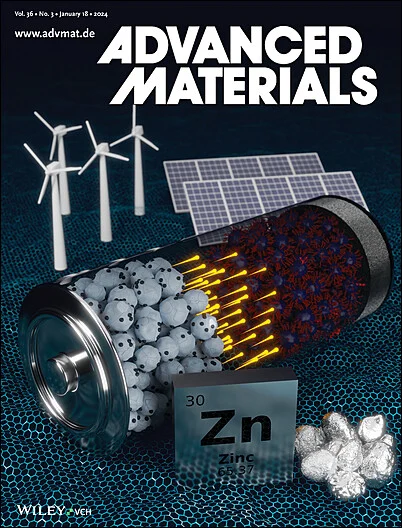福井功能工程凝胶电解质:长循环锌金属电池的热力学/动力学协同调节。
IF 27.4
1区 材料科学
Q1 CHEMISTRY, MULTIDISCIPLINARY
引用次数: 0
摘要
虽然传统的凝胶电解质解决了锌金属电池(zmb)中的电解质泄漏和枝晶生长等关键问题,但其固有的无法抑制竞争性析氢反应(HER)仍然是一个基本限制。本文提出了一种Fukui函数引导的分子工程方法来开发具有更高吉布斯自由能HER的凝胶电解质(HG-3TP) (ΔGHER)。还原的亲电性Fukui函数抑制了Zn电子的萃取,同时参与Zn2 +的溶剂化,降低了自由水活性。同时,衰减的亲核Fukui函数在Zn阳极上形成了惰性势垒,提高了H +的解吸能,降低了质子的扩散。这些协同效应抑制Volmer/Heyrovsky步骤,显著增加ΔGHER并抑制HER。同时,优化后的界面能量有利于均匀镀锌/剥离,同时保持阴极相容性。结果表明,HG-3TP锌电池表现出优异的长期循环稳定性,在Zn||Zn对称电池中可达到4000 h,在60°C下可维持710 h的工作时间,而在Zn||VO2满电池中,可在11000次循环中保持83.5%的容量。这项工作通过福井函数引导的电解质设计建立了一个热力学-动力学协调范例,推进了可扩展能量存储的超稳定zmb。本文章由计算机程序翻译,如有差异,请以英文原文为准。
Fukui Function-Engineered Gel Electrolytes: Thermodynamic/Kinetic-Synergistic Regulation for Long-Cycling Zinc Metal Batteries.
While traditional gel electrolytes address critical issues such as electrolyte leakage and dendrite growth in zinc metal batteries (ZMBs), their intrinsic inability to suppress the competing hydrogen evolution reaction (HER) remains a fundamental limitation. Herein, a Fukui function-guided molecular engineering approach is proposed to develop a gel electrolyte (HG-3TP) with higher Gibbs free energy of HER (ΔGHER). The reduced electrophilic Fukui function inhibits Zn electron extraction while participating in Zn2⁺ solvation to decrease free water activity. Simultaneously, attenuated nucleophilic Fukui function creates an inert barrier on Zn anodes, raising H⁺ desorption energy and lowering proton diffusion. These synergistic effects suppress the Volmer/Heyrovsky step, significantly increasing ΔGHER and inhibiting HER. Meanwhile, optimized interfacial energetics facilitate uniform Zn plating/stripping while maintaining cathode compatibility. As a result, Zn batteries with HG-3TP exhibit excellent long-term cycling stability, achieving 4,000 h in Zn||Zn symmetric cells and maintaining operation for 710 h at 60 °C, while demonstrating 83.5% capacity retention over 11 000 cycles in Zn||VO2 full cells. This work establishes a thermodynamics-kinetics orchestrated paradigm through Fukui function-guided electrolyte design, advancing ultrastable ZMBs for scalable energy storage.
求助全文
通过发布文献求助,成功后即可免费获取论文全文。
去求助
来源期刊

Advanced Materials
工程技术-材料科学:综合
CiteScore
43.00
自引率
4.10%
发文量
2182
审稿时长
2 months
期刊介绍:
Advanced Materials, one of the world's most prestigious journals and the foundation of the Advanced portfolio, is the home of choice for best-in-class materials science for more than 30 years. Following this fast-growing and interdisciplinary field, we are considering and publishing the most important discoveries on any and all materials from materials scientists, chemists, physicists, engineers as well as health and life scientists and bringing you the latest results and trends in modern materials-related research every week.
 求助内容:
求助内容: 应助结果提醒方式:
应助结果提醒方式:


